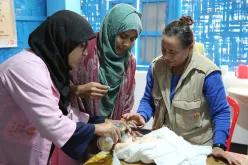This year, the year of the Nurse and Midwife - on World Health Day, we celebrate the work of these professionals, reminding world leaders of the critical role they play in people’s lives. To mark the day, UN Volunteer Sitara Khatiwada, from Nepal, shares her passion and dedication to strengthening the capacities of midwives serving low-income communities in Bangladesh.
UN Volunteer Sitara Khatiwada plays a vital role in mentoring midwives within the Government health facilities as well as the Rohingya Refugee Community in Cox’s Bazar, Bangladesh. She is serving as a Midwife Specialist in Emergency with UNFPA, and is responsible for the direct supervision, training and mentoring of national midwives employed by UNFPA through the project “Partners under Sexual Reproductive Health & Rights (SRHR)”.
Sitara shoulders a great responsibility to ensure that midwives engage closely within the communities. Health promotion activities by Sitara include educating the midwives on managing complications of pregnancy, obstetric and neonatal emergencies. This UN Volunteer also plans and conducts health education sessions to raise awareness on health issues among pregnant mothers and their relatives. Sitara has also previously served with UNDP in Somalia and UNFPA in South Sudan as a UN Volunteer.
Building capacities
My current experience has been unique in the sense working for the refugees’ health, unlike my other assignments, where I mostly worked with Government officials. It’s an enriching experience working with Bangladeshi midwives, contributing to the overall development of the midwives.
I feel fortunate to mentor some new midwives just starting off in Bangladesh. It is worldwide accepted that midwives contribute greatly to the reduction of maternal and neonatal mortality rate. However, for me, working among the densely populated Rohingya refugees, catering to their health needs to counselling their partners, mothers-in-law to adapt to certain changes in positive health habits have been a challenge; states Sitara Khatiwada, UN Volunteer for UNFPA in Bangladesh

UN Volunteer Sitara Khatiwada demonstrating how to create a cervical dilation chart, during a training session with midwives - Cox’s Bazar, Bangladesh
I use various methods to build the capacity of the midwives and ensure they perform well. For example, I make a learning tool with locally available waste material to teach them how to measure cervical dilation - a must know for the progress of labour. Now, almost all the 23 health centers have made this simple board that they practice every day.
Overcoming challenges
Midwifery is a novel concept in Bangladesh. Therefore, we face many hardships working with other health service providers explaining the roles of the midwives, what they do and can do apart from delivering babies and how they are different in caring for the patients.
It is challenging to continuously motivate the midwives amidst the low level of living conditions. I feel proud to see the midwives I have mentored trying to do their best to save the lives of mothers and children, understanding them with my little learnt spoken Bengali. Most midwives can now work independently with minimum supervision. This is my greatest achievement.
My way of achieving the goals is ensuring that the midwives feel cared for and protected and to make them feel that their voice is heard. I stand to speak for them and work together to see a smile on their faces at the end of the day after the successful delivery of a healthy newborn and a healthy mother. Treating mentees as my colleagues and working side by side with them and encouraging and empowering them makes learning sustainable.
Working together
There is a high level of cooperation and support in every aspect of my work, be it with the UNFPA office, other sector personnel, the UNV Office and colleagues and, of course, at the field level when it comes to direct patient care. Working together with the other health care providers, community volunteers and Community Health Workers to make sure we all speak the same language and give the same information to the community has been greatly fulling.
I am also a strong advocate of women’s empowerment and believe that educating girls and involving them in decision-making processes is vital to reduce discrimination against women and girls in all forms. I greatly enjoy my work in Bangladesh, applying my diverse experiences, both national and international. I am thankful to UNV for this opportunity to serve as a UN Volunteer again, with this community in Bangladesh.

